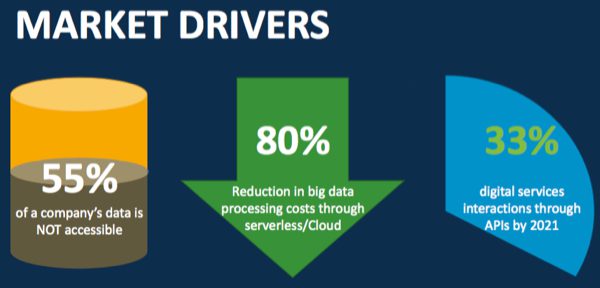Enterprise data integration vendor Talend has unveiled major updates to its Data Fabric platform, including faster machine learning, a data catalog, and advanced API development tools.
Talend Data Fabric is a unified platform for data integration across multicloud and on-premise environments. It includes the Talend Data Management Platform, listed in Datamation’s Top ETL Tools. Also featured in the Talend portfolio is Open Studio, which garnered a spot in Datamation’s Top Data Integration Tools.
The updates to Data Fabric include an advanced API delivery platform called Cloud API Services. It provides full API development lifecycle support, and helps users build and maintain APIs in shorter time frames. This enables companies to streamline and simplify data access.
Additionally, the API foundation provides a scalable, standardized solution that allows data access to both internal and external users. To speed this process, the Cloud API tool offers a graphical interface for easier development.
This graphical interface allows non-technical employees to “step through and define it,” Nick Piette, Director of Product Marketing at Talend, told Datamation. Staffers “don’t need to understand how to quantify it – it’s creating it for you under the covers.”
Among the market drivers in the data integration sector: the large amount of data that is not accessible. Source: Talend.
Data Catalog Enables Single Source
Talend’s Data Fabric update includes a Data Catalog that assembles a single source of reliable data. To better utilize data, the Data Catalog:
- Crawls data across all environments, including data lakes, on-premise and cloud-based.
- Allows easy search-based access so end users can deploy trusted data to make timely business decisions.
- Profiles and classifies all data, automatically suggesting key correlations between data.
These key correlations are particularly significant, and reflect a core trend in today’s Big Data market: data catalogs are evolving far past being mere repositories for metrics.
In the current environment, “data catalogs are providing information about relationships – relationships between customers, products, and employees,” Stewart Bond, Research Director at IDC, told Datamation.
Data catalogs allow users to “understand all those different relationships, inside the data,” he said. This cross-referenced data provides a major competitive advantage.
Leveraging Machine Learning, Serverless
Catering to the machine learning market, the updated Talend Data Fabric enables faster ML learning models at scale. It features native, serverless support for the Microsoft Azure Databricks and Qubole in AWS data platforms.
Tapping cost-efficient tools like serverless and spot instances, Data Fabric allows self-service Apache Spark processing. Customers can easily spin up a cluster and pay only for what is actually required.
Vendors like Talend leverage machine learning to not only allow users to run essential libraries, said IDC’s Bond, “but we’re also starting to see machine learning come into the products themselves, to automate data integration and data cataloging.”
The update to Talend Data Fabric will be available in November at no charge for Talend subscribers.




